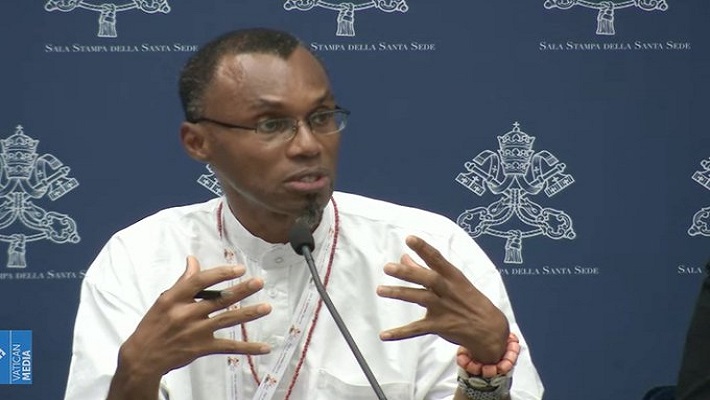By Paschal Norbert
VATICAN CITY, OCTOBER 18, 2023 (CISA)- While sharing his experience and support for the ongoing Synod on Synodality in Rome, theologian Fr Agbonkhianmeghe Orobator has said that the process of listening and discernment that are the convention of conversations at the Synod is more important than the outcome that will come from the assembly.
“I remain convinced that the process is going to be more important than the outcome. And the process for me has been truly enriching. Focusing on elements, mechanisms or frameworks of listening, dialoguing and discerning. I believe that this is the kind of framework or mechanism that would lead us as a community called the Church to experience a new way of being – where people no matter who they are, status, station or situation in the Church are able to be part of a process where they are not only heard but also able to contribute to a process of discernment. I am very grateful for the process that has been adopted,” said the Nigerian-born member of the Society of Jesus (Jesuit) during a briefing by the Synod of Bishops on October 17.
The immediate former president of the Jesuit Conference of Africa and Madagascar (JCAM), noted that the Synod on Synodality is a moment of grace for many theologians as it involves being part of the historical “making and remaking of the Church.”
“As a theologian, this is a privileged moment. This is what a theologian lives for because we are part of an experience, of a process of the Church making and remaking itself. In a way, this is a once-in-a-lifetime experience that really calls on theologians to dig deeper into the resources that they bring to enrich this process and to deepen this process and ensure this process brings out something new in terms of how we see, experience and live as a community called Church,” he noted.
The dean of the Jesuit School of Theology of Santa Clara University (JST-SCU) and a Synod delegate, maintained that the diversity of the participants of the Synod; their insights and the wisdom embedded in the diversity is a gift for the Church.
“I am sitting in a group of people at my table, all of us are from different countries. and the wisdom that each person brings, the wisdom that each one reveals and the gifts that each one brings, is a matter for enriching the universal Church. and for me this experience is one to live for and to work for,” said the Jesuit theologian.
In the briefing, Fr Orobator soft-pedalled concerns about some of the critiques of the ongoing Synodal process, saying “The work of this Synod will begin when the gathering here actually concludes because Synodality, as we have been told, is about how we live and work and journey together and that is going to be tested in the years to come but I believe that the robust process and mechanism, frameworks being trialled and tested and experimented will certainly provide the resources for this Synodal journey to continue and succeed.”
On the question of women diaconate or priesthood and the pope taking the front seat to offer his opinion on the subject in a response to a dubia sent to him by five senior cardinals, Orobator said it is important for people to know “that the Synod is a consultative body and does not make decisions.”
He warned, “As far I am concerned, the process is important and if we are distracted as (Prof Renee) mentioned by concentrating on niche issues but allowing ourselves to build a process – a framework that actually works. It becomes actually possible for us to address these issues in a way that is constructive and not confrontational.”
The director of the African Synodality Initiative (ASI), a collaboration of the Jesuit Conference of Africa and Madagascar (JCAM), the Symposium of Episcopal Conferences of Africa and Madagascar (SECAM) and the Association of Member Episcopal Conferences in Eastern Africa (AMECEA), established to develop resources to assist local churches in Africa to participate in the Synodality process, noted that the discussions inside the Synod Hall are not all about ‘convergence’ since many divergent opinions are also part of the conversations.
“From experience, there has not been any shortage of divergent and differences. Divergent positions and differences of opinions and what the process allows us to do is not only to note convergence or consensus but also to note divergent and differences and that is part of the process. I can testify that these divergent and differences have not degenerated into hostilities and animosity and so that it is the constellation of convergence of divergences and differences that is going to be the matter for creating something new so that no voice is suppressed on any of the issues,” he said.
On if the issues of LGBTQ and women ordination are “seriously and passionately” being discussed at the Synod. In the affirmative, the Jesuit priest said “I testify yes!”
